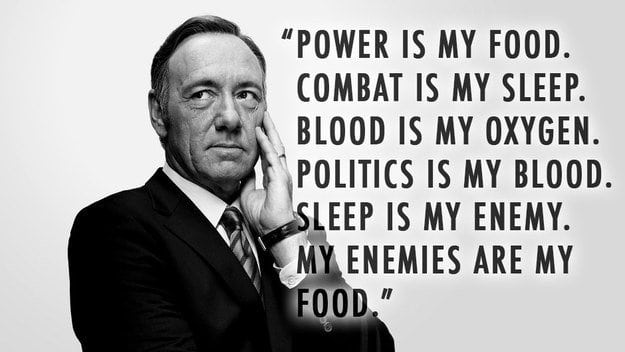
I finished watching the most recent season of House of Cards this past weekend. For those of you who are not addicted to the Netflix series, it is a show about Congressman Frank Underwood’s brutal climb to the presidency. He and his wife will do literally anything, including murder, to reach the top. Their ambition is not regulated by any sort of moral compass. They want power for its own sake.
For those of us climbing to the top of the food chain, there can be no mercy. There is but one rule: hunt or be hunted.
-Frank Underwood, House of Cards
The show is excellent not because it offers a profound moral lesson in the dangers of ambition. In fact, it often does the opposite. We root for Frank because we recognize a bit of ourselves in him. His ambition resonates with our own. It excites and stimulates us. It is, in a sense, a type of pornography.
Though we may recognize our deepest desires and are flaws when portrayed in the extreme, what’s tricky is being aware of them in our normal, day-to-day lives.
Thomas Merton was the Trappist monk who detailed his journey to the monastery in his autobiography, The Seven Storey Mountain. In his youth, he regarded himself an intellectual, writer, and social activist. To what end? Upon reflection, he realized he was writing not for some higher good, but for himself.
Of course, as far as my ambitions went, their objects were all right in themselves. There is nothing wrong in being a writer or a poet— at least I hope there is not: but the harm lies in wanting to be one for the gratification of one’s own ambitions, and merely in order to bring oneself up to the level demanded by his own internal self-idolatry. Because I was writing for myself and for the world, the things I wrote were rank with the passions and selfishness and sin from which they sprang. An evil tree brings forth evil fruits, when it brings forth fruit at all.
-Thomas Merton, The Seven Storey Mountain
Our broken nature and selfish ambitions are easy to see when presented in the form of Frank Underwood. They are much more difficult to see in our striving at work, our hopes for our side projects, and in our interactions with others.
Though I want to spread the word about the Ancient Wisdom Project so that I can direct people to sources of wisdom and advice that can help them, I realize I am just as driven by ego and the desire to be recognized as a unique and thoughtful writer. It feels good when someone praises something I write and I want more of it (as a side note, the comment space below these posts are open for just that purpose).
Frank Underwood is at least honest about his (lack of) moral compass and his desire for power. The rest of us are fooling ourselves.
We will never be rid of our broken nature. There will always be a Frank Underwood lurking underneath the surface. But hopefully we can do what Merton did and at least recognize when our baser natures are getting the best of us. No need to run off and become a monk to do that, but you can’t do it yourself. If we were capable of self-monitoring, Earth would be a utopia. Participating in ancient wisdom rituals is a good place to start. Why reinvent the wheel?
Let’s continue to ask ourselves the hard questions and have the courage to address the uncomfortable truths.